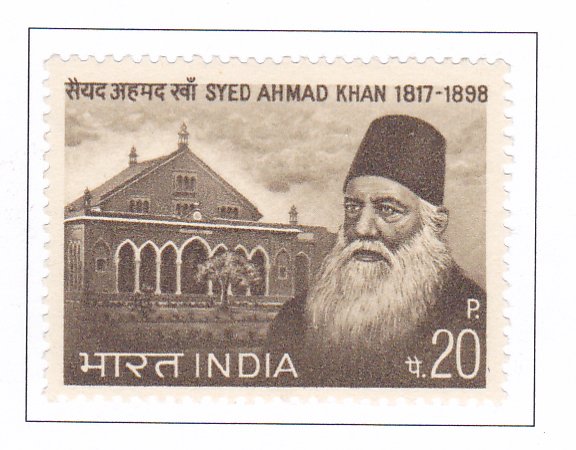Syed Ahmad Khan 1817-1898

Technical Data
| Date of Issue | October 17, 1973 |
|---|---|
| Denomination | 20 nP |
| Quantity | 1,000,000 |
| Perforation | comb 13 |
| Printer | Security Printing Press, Nashik |
| Watermark | No Watermark |
| Colors | Sepia |
| Catalog Codes |
Michel IN 579 Stamp Number IN 595 Yvert et Tellier IN 381 Stanley Gibbons IN 699 |
| Themes | Famous people | Headgear | Men | Reformers |
Syed Ahmad Khan, born on October 17, 1817, in Delhi, and passing away on March 27, 1898, in Aligarh, was a towering figure in India’s transition from medievalism to modernism. His life was marked by a relentless struggle against conservatism, superstition, inertia, and ignorance, making him one of the greatest Indians of the nineteenth century.
Recognizing education as the key to social, political, and economic progress, Syed Ahmad Khan dedicated himself to advancing education, particularly among Muslims who were resistant to change. In 1863, he called upon all Indians to focus on improving the country’s educational system. He founded the Scientific Society in the same year to promote a scientific mindset and later launched the Indian Institute Gazette to popularize the society’s goals.
In 1875, Syed Ahmad Khan established the M.A.O. College in Aligarh with the vision of it evolving into a university that would propagate the ideals of free inquiry, tolerance, and morality. His dream materialized twenty-two years after his demise when the M.A.O. College transformed into Aligarh Muslim University, becoming an intellectual and cultural hub in tune with the progressive spirit of the times.
Syed Ahmad Khan also played a crucial role in social reform, challenging medievalism and superstition through initiatives like the journal Tahzib-ul-Akhlaq, which aimed to raise awareness of modern life’s challenges and laid the groundwork for Urdu journalism. He made significant contributions to literature, religion, ethics, philosophy, and history, pioneering archaeological studies of Delhi with his work “The Asar-us Sanadid.”
As a religious thinker, Syed Ahmad Khan advocated for nationalism and sought to reinterpret religion in light of evolving societal conditions, founding a new school of thought (Ilm-i Kalam) that reevaluated traditional Muslim social ethics.
By issuing a stamp in his memory, the P & T Department honors Syed Ahmad Khan’s remarkable contributions as a social reformer, educationist, and builder of modern India, whose influence continues to resonate deeply in Indian society.
